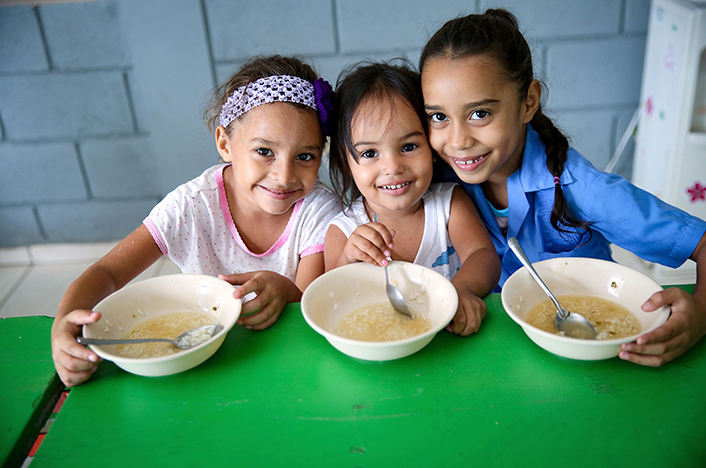From Food Scarcity to Abundance: Transforming Lives Through Meal Programs
In a decentralized, community-based approach, helping the poor involves collective action and support. Communities establish resource-sharing initiatives like funds, food banks, and clothing drives, where members contribute goods or funds for distribution. Skill-sharing workshops and education programs enhance individuals’ capabilities and economic prospects. In this article we delve into Transforming Lives Through Meal Programs.
Microfinance and peer-to-peer lending provide access to small loans for entrepreneurship or basic needs. Barter systems enable goods and services exchange without money. Support networks and mentorship offer guidance to those in need. Initiatives like community gardens promote food security and self-sustainability. Overall, leveraging collective resources, skills, and networks effectively addresses the needs of the less fortunate.
Transforming Lives Through Meal Programs
Considering these efforts, meal programs play a vital role in efficiently addressing immediate hunger needs within this framework, ensuring equitable access to nutritious food for all members of the community.

Community based initiatives for meal programs
Community-based initiatives for meal programs are pivotal in addressing food insecurity at the grassroots level, ensuring that individuals and families have access to nutritious meals within their local communities. These initiatives are built upon the collaborative efforts, resources, and support networks within communities, harnessing collective action to tackle hunger and promote wellbeing. Across various regions, community kitchens stand as shining examples of such initiatives. These kitchens serve as communal spaces where volunteers, often supported by local organizations or charities, come together to prepare meals using donated ingredients. The meals are then distributed to individuals and families facing food insecurity, either through meal pickups or delivery services. Beyond providing nourishment, community kitchens foster a sense of belonging and solidarity, offering a warm meal and a supportive environment to those in need.
In addition to community kitchens, food cooperatives play a significant role in enhancing food accessibility and affordability within communities. These cooperatives are typically community-owned and operated grocery stores where members collectively purchase food at wholesale prices. By pooling resources and purchasing power, food cooperatives make nutritious options more financially accessible to all members of the community, including those with limited financial means. Moreover, the cooperative model encourages community engagement and ownership, empowering residents to actively participate in shaping the food landscape of their neighborhoods.
Another cornerstone of community-based meal programs is the establishment of community gardens. These gardens are cultivated by community members on shared or donated land, providing a space for individuals to grow fruits, vegetables, and herbs. The produce harvested from these gardens not only supplements meal programs but also promotes self-sufficiency and food sovereignty within the community. Community gardens offer opportunities for education, skill-building, and social connection, as residents come together to cultivate and harvest fresh produce. Furthermore, community gardens serve as green spaces that enhance the aesthetic appeal of neighborhoods and contribute to environmental sustainability by promoting local food production.
Community-Based Meal Programs: Fostering Solidarity and Addressing Food Insecurity
Beyond these specific initiatives, community-based meal programs embody a broader ethos of mutual aid, solidarity, and social responsibility. They reflect a recognition of the interconnectedness of individuals within a community and the shared responsibility to ensure that everyone has access to the basic necessity of food. Moreover, these initiatives often operate in tandem with other community services and support networks, such as food banks, shelters, and outreach programs, forming a comprehensive safety net for those experiencing food insecurity.
In conclusion, community-based initiatives for meal programs exemplify the power of collective action in addressing complex social issues like food insecurity. By leveraging local resources, knowledge, and networks, these initiatives not only provide immediate relief to those in need but also foster resilience, empowerment, and community cohesion. As we continue to navigate the challenges of food insecurity, community-based approaches offer a promising path forward, grounded in principles of equity, inclusivity, and solidarity.

Economic Benefits of Community-Based Meal Programs: Nourishing Society for Prosperity
Contributing to community-based meal programs also brings about economic benefits to society as a whole. Access to nutritious food through these initiatives can lead to improved health outcomes for individuals, subsequently reducing healthcare costs. By preventing or mitigating diet-related illnesses such as obesity, diabetes, and heart disease, communities experience lower expenses related to hospitalizations, medications, and treatments. Additionally, individuals who have access to nutritious meals are better equipped to participate actively in the workforce. Proper nutrition supports cognitive function, energy levels, and overall productivity, resulting in fewer missed workdays and higher job performance. This boost in workforce productivity contributes to economic growth and prosperity.
Furthermore, community-based meal programs often source ingredients locally, supporting local farmers, food producers, and businesses. This localized approach to food procurement stimulates economic activity within the community, creating jobs and fostering entrepreneurship. Additionally, when individuals have more disposable income as a result of reduced food expenses, they are likely to spend it within their local economy, further stimulating economic growth. Addressing food insecurity through these initiatives also promotes social cohesion and stability within neighborhoods and regions. Stronger social ties and stable communities create an environment conducive to economic development and investment.
Moreover, by addressing food insecurity at the community level, there is a potential reduction in the need for government-funded social welfare programs aimed at providing food assistance. This can lead to cost savings for governments, allowing resources to be reallocated to other priority areas such as education, infrastructure, or healthcare. Investing in community-based meal programs can also yield long-term economic benefits by breaking the cycle of poverty and dependency. When individuals have access to nutritious food, they are better positioned to pursue education and employment opportunities, ultimately contributing to higher earning potential and economic mobility for themselves and future generations.
In summary, contributing to community-based meal programs yields economic benefits for society by reducing healthcare costs, increasing workforce productivity, boosting local economies, promoting social cohesion, and reducing reliance on social welfare programs. These initiatives contribute to a healthier, more resilient, and economically vibrant community.
Meal programs may address outlander societies as well
Long-Term Stability and Security: Addressing root causes of poverty and inequality in other countries can contribute significantly to long-term global stability and security. Poverty, lack of access to education, healthcare, and basic resources, as well as humanitarian crises, can create conditions that foster conflict, extremism, and mass displacement. By investing in sustainable development, promoting economic opportunities, and addressing humanitarian needs in vulnerable regions, countries can help mitigate these risks. Stable and secure societies are more resilient to external threats and less likely to become breeding grounds for violence or extremism. Moreover, fostering stability and security in one region can have positive spill-over effects, promoting peace and prosperity in neighboring countries and beyond. Ultimately, addressing global inequalities and vulnerabilities is essential for building a more peaceful and secure world for everyone.
Mutual Benefit: Helping people in other countries is not only an act of solidarity but also a recognition of the interconnectedness and interdependence of nations in a globalized world. Global challenges such as poverty, climate change, and pandemics do not respect national borders and require collaborative, coordinated responses. By supporting efforts to alleviate poverty, improve health outcomes, and address environmental degradation in other countries, nations can create mutual benefits for all involved. For instance, investing in infrastructure development and capacity-building in developing countries can open up new markets and economic opportunities for businesses in donor countries. Similarly, addressing health disparities and disease outbreaks in one region can prevent the spread of infectious diseases globally, safeguarding public health and economic stability worldwide. Additionally, promoting education and empowerment for marginalized communities in other countries can foster a more skilled and resilient global workforce, driving innovation, economic growth, and prosperity for everyone. In this way, helping people beyond one’s own borders not only serves humanitarian purposes but also contributes to mutual prosperity, security, and well-being on a global scale.

Final thought
In a world where borders are increasingly porous and challenges are shared across nations, the imperative to extend help beyond one’s own community or country becomes ever more pressing. Whether motivated by humanitarian values, a sense of global interconnectedness, ethical responsibility, or the recognition of mutual benefit, reaching out to those in need across borders is not just an act of charity but an investment in a more stable, secure, and prosperous world for all. By addressing root causes of poverty, inequality, and insecurity in vulnerable regions, nations can build resilience, foster cooperation, and create opportunities for mutual growth and prosperity. In doing so, we affirm our shared humanity and our commitment to building a future where every individual has the opportunity to thrive, regardless of where they call home.
read more: Beyond Hunger: The Impact of Nutrition Programs on Child Development



